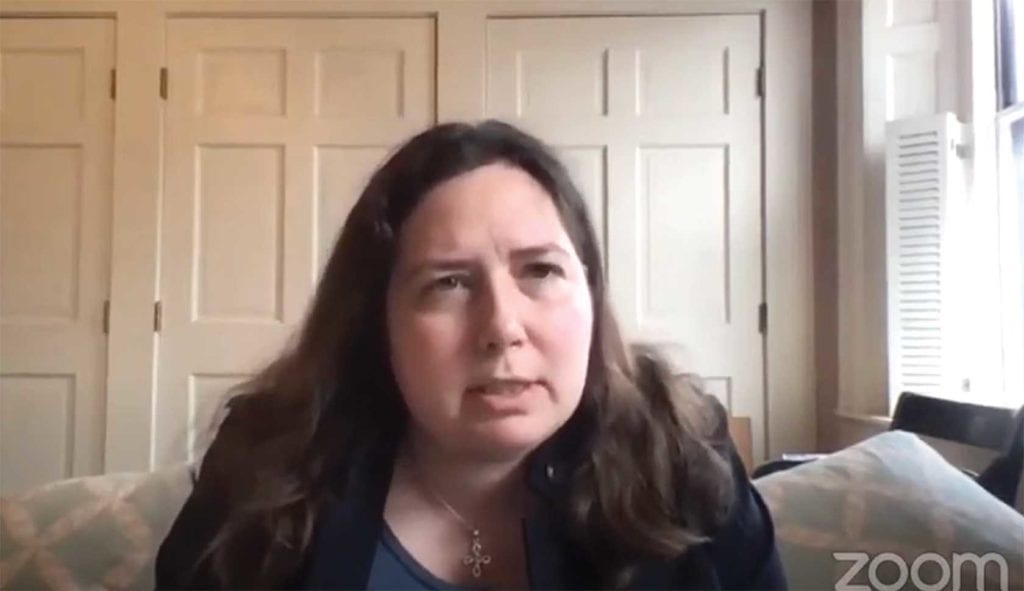Council seeks curbs on cop contracts
Councilors want accountability, transparency

City councilors last week drilled down on the contracts police unions have inked with city officials as part of an ongoing effort to rein in overtime costs and bring more transparency and accountability into the department.
The Nov. 30 working session, chaired by District 8 City Councilor Kenzie Bok, was aimed at giving councilors and the public insights on how city officials plan to change police policy through budget negotiations, but neither city of Boston officials nor officials from the Boston Police Department agreed to participate.
While the City Council has the power to accept or reject the contracts the administration of Mayor Martin Walsh negotiates with the police, they have no direct knowledge of what the administration is seeking in its negotiation with police unions, Bok noted.
“These police contracts have a real bearing on the lives of our citizens in the city of Boston, our residents,” she said at the meeting, “and they’re kind of opaque and a little bit hard for folks to know the ways in which how we do policing is tied up in them.”
In a memo released the same day, Bok outlined a set of four principles for discussion she said councilors should keep in mind while advocating for changes to police contracts: fiscal responsibility, accountability for use of force, “civilianization” of civilian work, and transparency to enhance and ensure public trust.
“I do think that it’s important for a majority of the council to be able to come to some kind of clear articulation of public policy expectations vis-à-vis these contracts — and I think we should do that sooner rather than later,” she said during the working session.
Much of the discussion revolved around fiscal responsibility.
The BPD’s overtime budget has increased from $40 million in 2010 to $72.5 million for the 2021 fiscal year, an increase Bok noted is four times the rate of inflation. The police contracts include provisions that some say give officers maximum pay for minimum effort. For example, when off-duty Boston police officers show up to court for even a five-minute delivery of evidence, they are paid for a full four hours at time-and-a-half.
District 5 Councilor Ricardo Arroyo said overtime is a central component in a matrix of contractual agreements that make many police officers among the highest paid public employees in the country.
“We have officers making more than the mayor, making more than the governor, making more than the president of the United States of America in any given year,” he said. “That can’t be normalized, and I think it has to a large extent been normalized.”
Arroyo and other councilors have in recent months advocated for a reexamination of the overtime provisions in the city’s contracts with police unions. In June, city councilors and anti-police-violence activists called on the city to cut 10% out of the department’s $414 million budget and channel the $41 million saved into youth services and anti-violence initiatives. Walsh instead made a symbolic cut of 20% from the department’s overtime budget and channeled the resulting $14 million into social services, including some that are run within the police department.
Arroyo and four other councilors voted against the Walsh administration’s city budget in a vote that split largely along race lines.
While Bok and other councilors asked pointed questions about police pay in last week’s working session, some, including District 1 Councilor Ed Flynn, expressed support for the police. In his remarks, Flynn called for increasing the number of officers on the force as a way to cut overtime.
“Over the last year, it’s been a very difficult time for everyone in our city, including the police, but I’m also concerned about the number of police we have in the department,” he said. “I think it needs to significantly be increased. You know 300, 400 more officers.”
Responding to Flynn’s call for more officers, Bok said officers who are on extended sick leave drive a significant portion of the department’s overtime costs.
“The Department reported to us that they’re replacing about 94 officers’ worth of work a day,” she said. “That’s driving our overtime costs in a huge way.”
Bok pointed out that the department carries an unusually high number of officers on sick leave, placing additional strain on the overtime budget. In the last two years, the number of officers out sick increased from 158 to 270.
“That is having a tenth of the force out at any one time,” she said. “It is not a new normal that we can come to live with. It’s not something that we could work with any other department.”
No city response
Administration officials cited confidentiality in explaining their refusal to testify, in a letter that Bok read at the session.
“As was previously communicated to the council, collective bargaining strategies and our objectives are confidential matters that are not appropriate to disclose at a public hearing,” Bok read from the letter. “The standard for confidentiality and collective bargaining strategy is longstanding, and any change in the standard should be approached with caution and care, as exceptions made in one instance could well set a precedent for others.”
Bok said the confidentiality requirements cited by city officials ought not preclude them from letting councilors know what their policy objectives are going into negotiations with the unions.
“I feel quite confident that the administration could come and speak to us about the policy priorities and expectations guiding their collective bargaining strategy … without running afoul of any of that,” she said. “Obviously, this is a different interpretation.”
District 4 Councilor Andrea Campbell agreed.
“We of course want to know what the administration is advocating for, what they are pushing,” she said. “And I think there’s a way to do that while still, of course, honoring the process of negotiation.”
Police contracts will likely be negotiated this year, although there is no clear deadline for the negotiations.






